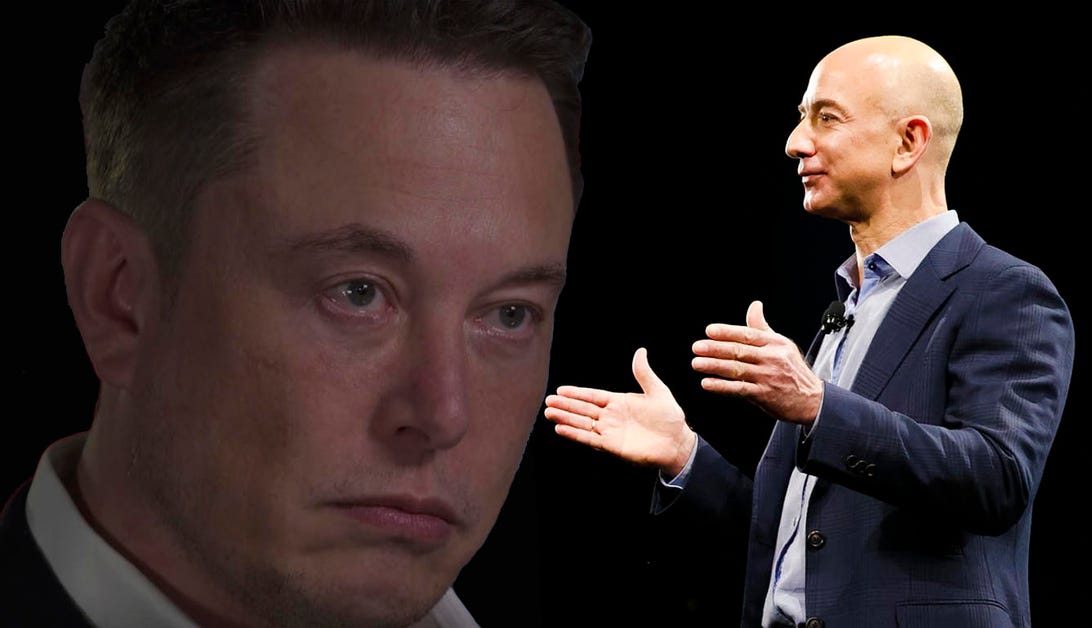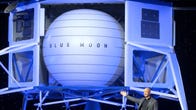
It's a new chapter in the battle of billionaires in space, and the stakes are higher.
CNETOne battle between billionaires may be over, but the war continues. Forget about Jeff Bezos and Richard Branson and those brief joyrides to the edge of space that we saw last month. The real conflict to watch is between Bezos' Blue Origin and Elon Musk's SpaceX, and the stakes are much higher than the Karman Line and which imaginary boundary marks the beginning of space. This time the feud has ensnared NASA and could hold hostage humanity's leading plan to return to the moon.
In April, NASA picked SpaceX and its Starship concept to provide the vehicle that will carry Artemis astronauts to the surface of the moon as soon as 2024. Fellow applicants Blue Origin and Dynetics were snubbed in the process. After its protests were denied by the US Government Accountability Office, Blue Origin filed a lawsuit against NASA in federal court on Monday.
"Blue Origin filed suit in the US Court of Federal Claims in an attempt to remedy the flaws in the acquisition process found in NASA's Human Landing System," Blue Origin said in a statement. "We firmly believe that the issues identified in this procurement and its outcomes must be addressed to restore fairness, create competition and ensure a safe return to the moon for America."
NASA's decision to select just one Human Landing System contractor for its moon mission was a surprise; executives within the space agency had expressed their hope to make more than one award in order to have a competitive development process. NASA later said Congress didn't appropriate enough funding to offer two contracts. In their resulting protests, Blue Origin and Dynetics argued that NASA should have revised the program terms when it became clear it only had the budget to make one award. Further, the protest argued NASA improperly negotiated a final price point with SpaceX, the low bidder of the three.
Those arguments were rejected by the GAO, and although Monday's lawsuit was filed under seal, Blue Origin's motion indicates it will be citing the same information presented to the GAO along with "additional sensitive information."
In short, Blue Origin is suing because NASA and the federal government sided with Musk and SpaceX, yet again.
Oh, you weren't aware of this pattern of space-based scorn and spite? Have I got a tale for you.
United by passion, divided by its pursuit
Legend has it there was a time when Musk and Bezos were friendly competitors in the space, uh... space.
The pair were photographed having a meal together back in 2004, when both space companies were still in their infancy. After the meeting, SpaceX would make its first successful test launch of a Falcon 1 in 2008, while Blue Origin conducted a few low-altitude flights of small test vehicles during the intervening four years.
The duo largely stayed out of each other's way for nearly a decade, but by 2013, it was clear the relationship had soured. At the time, NASA was looking to lease the historic launch pad 39A that sent the Apollo astronauts to the moon. Both companies put in proposals. But before a tenant was selected, Blue Origin filed a protest following comments from NASA Administrator Charles Bolden, which Bezos' company interpreted as favoring SpaceX. In the end, the GAO rejected the protest, and SpaceX got the launch pad. The whole episode played out in a way that was awfully similar to the latest dust-up over HLS.
Musk even threw some public shade at Bezos in response to Blue Origin's protest, kicking off a war of words and legal manuevers that continues today.
"If (Blue Origin does) somehow show up in the next five years with a vehicle qualified to NASA's human rating standards that can dock with the Space Station, which is what Pad 39A is meant to do, we will gladly accommodate their needs," Musk told SpaceNews at the time. "Frankly, I think we are more likely to discover unicorns dancing in the flame duct."
A little over a year later, SpaceX scored another victory over Blue Origin with the help of the federal government. This time the US Patent Trial and Appeal Board ruled that the majority of a Blue Origin patent for landing a space launch vehicle at sea was actually unpatentable. SpaceX argued, and the board agreed, that the concept had already been conceived by various people in science and even science fiction for decades.
Let the street fight begin
Up until this point, the tension between SpaceX and Blue Origin wasn't in the public so much, unless you kept a pretty close eye on the space industry. That began to change when Blue Origin made its first, historic successful landing of one of its New Shepard rockets. The company and Bezos were happy to shout the milestone from the mountaintop, as it came during a period when SpaceX had been attempting -- but had yet to succeed at -- landing one of its Falcon 9 rockets at the end of a mission.
Musk was all too eager to clap back, noting that SpaceX had made a number of successful landings of its "Grasshopper" prototypes in 2012 and 2013. He also noted, fairly, that the orbital missions carried out by Falcon 9 are significantly more complex and difficult than a New Shepard "up and down" flight to the Karman line and back.
Bezos would retort the following month when SpaceX finally nailed a Falcon 9 landing.
He offered a snarky congratulations "on landing Falcon's suborbital booster stage" with unspoken emphasis on the suborbital part and added "Welcome to the club!"
Bezos and Musk also find themselves in potential competition when it comes to satellite broadband. SpaceX has already started offering high-speed internet from low earth orbit via Starlink, while another Bezos venture you may have heard of called Amazon is working on a similar offering called Project Kuiper.
In response to a 2019 article detailing Project Kuiper, Musk simply called Bezos a copycat on Twitter.
To the moon, Elon!
But the current chapter in this 21st century fancy billionaire space Hatfield and McCoy story has the highest stakes yet. This is about each man's magnum opus: the competing civilization-altering visions each hopes will be his legacy.
You've probably seen something about Musk's audacious plan to send humans to Mars and make us a "multiplanetary species." Bezos isn't such a fan of this idea, and in 2019 he unveiled his own idea for the future of humanity. It involves moving much of our heavy industry into orbit, along with some cool space stations in order to better preserve Earth's environment.
And the "road to space" Bezos described in 2019 goes through the moon and a lander and rover designed by Blue Origin.
"It's time to go back to the moon, this time to stay," Bezos declared on stage.
But, it would seem, Blue Origin's price to make that happen wasn't right for NASA. Instead, SpaceX's Starship, the same vehicle Musk plans to use to execute his Martian masterpiece, is the ride the space agency is now planning its next act around.
So, Blue Origin returned to the playbook it has used in the past when spurned in favor of SpaceX, fighting NASA's decision in the federal bureaucracy. When that route proved to be a dead end again, the next move was a media campaign criticizing Starship as a lunar lander, referring to it as "what immense complexity and heightened risk looks like:"

This infographic wasn't approved by NASA or SpaceX.
Blue OriginNaturally, Musk responded on Twitter, basically saying that Blue Origin's criticisms are exagerrated and pointing to SpaceX's record of successful missions to the International Space Station.
Blue Origin's latest move to sue came after one last attempt to woo NASA with cold cash. In an open letter to NASA Administrator Bill Nelson late last month, Bezos offered to cover $2 billion of NASA's expenses in exchange for an HLS contract. It was essentially a hail mary offering of a deep discount after the sale to a competitor was already done.
But NASA has continued to indicate that, for now, it wants to go to the moon with SpaceX and only SpaceX. Blue Origin still refuses to concede, even if it means delaying humanity's lunar destiny in the process. NASA's 2024 target for new boots on the moon has always been aspirational, to put it generously, and with the key contract tied up in court, it's a goal that now feels double impossible.
"As soon as possible, the agency will provide an update on the way forward for returning to the Moon as quickly and as safely as possible under Artemis," a representative for the space agency told CNET.
SpaceX didn't immediately respond to requests for comment.
Follow CNET's 2021 Space Calendar to stay up to date with all the latest space news this year. You can even add it to your own Google Calendar.
Article From & Read More ( Why Jeff Bezos' Blue Origin is going to war with NASA and SpaceX - CNET )https://ift.tt/3smR1Mf
Business
Bagikan Berita Ini















0 Response to "Why Jeff Bezos' Blue Origin is going to war with NASA and SpaceX - CNET"
Post a Comment